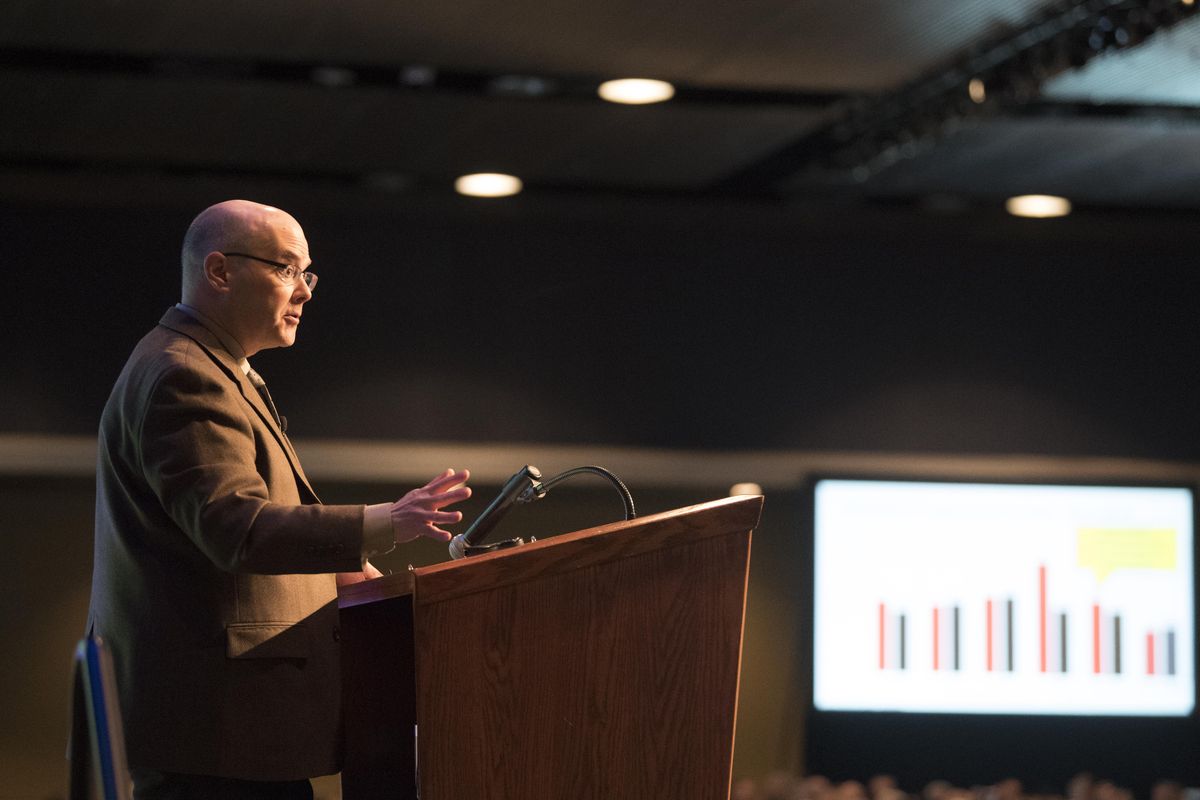Local economists: Regional economy poised for growth

If you believe things have been pretty good for business and households in the Inland Northwest recently, you’re right.
And if you think the area’s going to continue to hum along in what is now the nation’s 101st month of economic expansion, you’re likely right there, too.
But world discord or partisan conflict in Washington, D.C., could stem optimism, insert uncertainty and stifle growth – the scenarios most likely to end the positive economic run.
That’s according to two local economists, who looked back at 2017 and ahead to next year during the 20th Annual Economic Forecast breakfast Wednesday at the Spokane Convention Center. John Mitchell of M&H Economic Consultants, and Grant Forsyth, chief economist at Avista Corp., provided an optimistic picture for the roughly 600 in attendance at the yearly event sponsored by Greater Spokane Incorporated and the Journal of Business.
With low inflation, climbing wages and a workforce that remains at or near full employment, “it doesn’t get more exciting than this,” Mitchell said.
“The national expansion is old but it’s not dead,” said Mitchell, whose comments focused mostly on the national economy. “Expansions don’t die of age; they die because of shocks and mistakes” such as imbalances in the financial sector and the housing market that were present at the beginning of the downturn in late 2007.
Present conditions of federal policy, the markets and financial industry are different than 10 years ago, Mitchell noted.
“You look around and you don’t see it,” he said.
Mitchell predicted a Fed under Trump chairman nominee Jerome Powell, if approved, will continue on much the same path as with outgoing Fed Chair Janet Yellen.
The Fed will continue to be a steadying force with an expansionary fiscal policy that encourages economic growth under controlled inflation. The latter will pick up nationally, while labor markets remain tight and acquisition of housing permits go up, supporting a strong economy nationally and locally, he said.
The greatest threat to the nation’s continued economic growth is external, he said, citing unrest or economic collapse overseas as prime examples.
But questions remain regarding what effects future federal tax legislation and Trump administration immigration and trade policies will have on the economy’s ability to continue expanding.
Growth in wages and jobs in the Northwest and nationally will continue next year, Mitchell predicted, all positive factors for the economy.
Forsyth concurred, citing regional factors. The Avista economist predicted wages – propelled by a tight labor market particularly in health care and construction – will continue to rise and outpace inflation.
Forsyth predicted employment growth in 2018 – although slowing when compared to 2 percent in 2017 – would continue to be a respectable 1 percent to 1.5 percent in Spokane and Kootenai counties.
This strong labor market has brought an influx of people to the region, and will continue to do so, Forsyth said. Population growth exceeded 1 percent in Spokane County and 2 percent in Kootenai County each year from 2015 to 2017, and the economist sees the same respective growth percentages for each county in 2018.
“We are growing much faster than what you’d expect…,” he said. “This is good news.”
The growth in population, wages and employment, when combined with low interest rates, have led to an increase in demand for houses and apartments. Alongside a lack of new housing construction due to a skilled labor shortage and dwindling availability of urban lots, this has led to increases in house prices and apartment rental prices, a trend Forsyth said will continue in 2018.
Citing the Federal Housing Finance Agency housing price index, Forsyth said existing home price growth should be more than 10 percent in Spokane and Kootenai counties this year. He said he sees the same trend for 2018 because of the continuing supply-and-demand dynamic of recent years.
The result, Forsyth said, are stretched mortgage and rental budgets for households.
Homes, although perhaps more expensive year to year, will continue to be in high demand thanks to growth in the area’s population, especially in what Forsyth called “satellite communities,” such as Liberty Lake, Post Falls, Cheney and Rathdrum.
“A great filling in is going to occur” in the near future from Cheney to Rathdrum, he said.